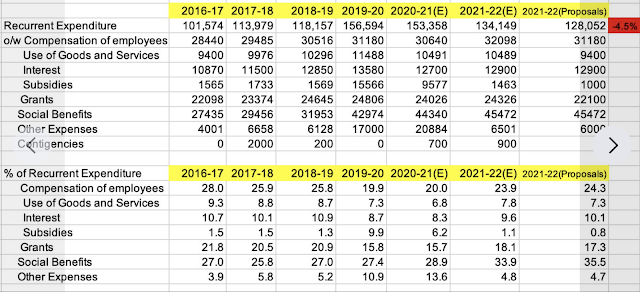Despite the measures taken by Government, such as the Wage Assistance Scheme, the Self-Employed Assistance Scheme and other support provided to businesses and individuals to mitigate the negative impact of the pandemic on the economy , the recovery plan to propel Mauritius into the era of innovation and new technologies, the ambitious projects like the Côte d’Or Data Technology Park , Pharmaceutical Industry …, our magician ,our Chancellor of the Exchequer, our Dr Payadachy, by one wave of his magic wand , assured us that Budget 2020-2021 will turn out to be a balanced budget.
If we are having a balanced budget or a -0.9% budget deficit to GDP based on the latest estimates, why bother to reduce recurrent expenditure by 25% ? Are we aiming for a budgetary surplus for FY 2021-22 in these troubled times ? Why such austerity measures if we are succeeding in reducing our budget deficits?
Or Is it because Moody’s has caught up with their budgetary tricks and is now concerned about the “ erosion of economic and fiscal strength” including a continuing deterioration in debt metrics, weakening monetary policy effectiveness as well as rising inflationary risks which would inevitably result in a further downgrade to junk status?
You recall that we had cried foul at such colourable accounting in the budget and our estimate, which was later confirmed by the IMF, for the consolidated budget deficit for fiscal year 2020-21 was -14.7% of GDP. We had argued that we should not be treating the Rs 60 billion transfer to Government from BoM as revenue but as a financing item in our budget deficit calculations.
While our local magician was rejoicing prematurely “Nous n’avons pas eu de hausse de l’inflation qui peut en résulter avec une augmentation de la masse monétaire. Nous n’avons pas eu. Nous avons pu contenir l’inflation…” , we were sounding the alarm that with the subsequent accelerated depreciation of the rupee and the inflationary expectations being revised significantly upwards, our Central Bank with its limited credibility and poorly anchored inflationary expectations, may find itself constrained in its ability to use monetary deficit financing without adding to inflationary pressures.
Moody’s and the IMF are proving us right and IMF seems to be putting pressures now on Government for a solid programme of fiscal consolidation which should have started years back.
I do not believe that this government, which has failed in maintaining sound fiscal and debt metrics because of its populist measures, is serious about restoring fiscal discipline and cutting back on recurrent expenditure by 25%. We had gone through this before – you recall the 10% cut in recurrent expenditure they had promised us – and they had failed miserably in meeting their targets.
Working out the possibilities of drastically cutting down the recurrent expenditure as shown in the last column of our attached table, given the estimates for FY 2021-22. Our results show a maximum reduction of only 4.5%. A more realistic estimate for the cuts in subsidies, grants and other expenses yields a 2.5% reduction in recurrent expenditure.
Even relative to the overblown recurrent expenditure voted for the the 2020-2021 Budget, ( which include the Wage Assistance Scheme, the Self-Employed Assistance Scheme and other support provided to businesses and individuals ), the maximum reduction is limited to some 17% .( 12.5% + 4.5 %)
Is it mere bluff ? These radical and incredible promises, across the board, may prove to be costly. Covid-19 has not just pummelled our economy. It has worsened one of today’s great scourges: inequality- with daily wages on the brink of starvation. There’s already incipient anger over the rapidly rising cost of living.
If we include the financial imbalances such as dangerous corporate-debt levels, the inexorable slide into debt distress and loss of jobs, it is likely that state aid to support households and industries will remain ubiquitous. As we navigate through the unprecedented economic crisis,we will need more rather than less of government interventions.



